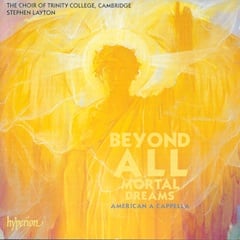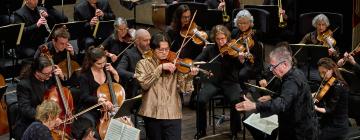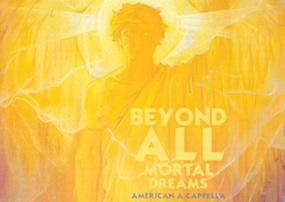
The U.S. and Canada may be secular nations, but you’d never know it from Beyond All Mortal Dreams: American A Cappella (Hyperion), the latest CD from the Choir of Trinity College, Cambridge. All but 5 of theCD’s 19 selections by American and Canadian composers of the present and past centuries are explicitly Christian, and one of two settings of poems by Henry Wadsworth Longfellow includes such Christian terminology as “angels” and “soul.” Is such an anthology truly representative of the large body of 20th-century North American choral music, or does it in fact reflect a preference on the part of English choirs and directors for repertoire that draws on their expertise in church music?
Despite questions about the repertoire and the willingness of 20th- and 21st-century American composers to step beyond the church, the quality of the musicianship on this disc is clear. Under the direction of Stephen Layton, who is also known for his superb recordings with his ensemble Polyphony of choral music by Americans Morten Lauridsen and Eric Whitacre, the Trinity College Choir brings a very chaste, English sound to music by the eight chosen composers. The choir sings with minimal vibrato, producing a sound distinguished by the soaring, choirboy-purity of its high sopranos and the warmth of its vocalism. Its legato, too, is impeccable. Altogether it’s a wonderful sound, ideally suited to the chosen repertoire.
Those who share my fondness for neo-Romantic music will love the opening track, René Clausen’s Tonight Eternity Alone (1991). Clausen (b. 1953), who directs the Concordia College Choir in Minnesota, beautifully captures the sense of wonder and eternal vastness in this excerpt from Thomas S. Jones Jr.’s Dusk at Sea. In this work and a few others, the singers even manage to suppress their British accents. When soloists come to the fore, however, their classic English “choral” vowel pronunciation differentiates them from American choirs that favor more colloquial speech.
By contrast, while Steven Stucky (b. 1949) in one sense moves backward in time in his Three New Motets ‘in memoriam Thomas Tallis,’ his far more modern-sounding harmonies add plenty of spice to the mix. The final motet, “O vos omnes,” seems a cop-out when it concludes a two-line setting of a responsory about the sorrow that surpasses all sorrow with a major key resolution.
Several other composers, such as the University of North Dakota’s Edwin Fissinger (1920–1990), Messiaen expert Frank Ferko (b. 1950), and British-born Canadian Healey Willan (1880–1968), also draw on the past. Fissinger integrates Gregorian motifs with more contemporary harmonies; Ferko sets three works by Hildegard von Bingen; and Healy writes in a style that, to the ears of liner note writer Gabriel Crouch, reflects the musical language of Stanford, Parry, and Finzi.
The sacredness of the extremely beautiful The Day Is Done, set by Stephen Paulus (b. 1949) to Longfellow’s poetry, also looks backward. Its moving stillness brings to mind the ineffable beauty of Vaughan Williams’ Silent Noon, especially in the recording by the incomparable Kathleen Ferrier.
The youngest composer represented, Norwegian-born and Juilliard-trained Ola Gjeilo (b. 1978), may now be a resident of New York City, but his two settings from the Catholic Mass hardly speak of the city of Copland, Bernstein, Sondheim, Reich, and Glass. His Sanctus is especially hallowed, and Phoenix, which he wrote for the Phoenix Chorale, plumbs the extreme reaches of the choir’s dynamics, from fff to the concluding ppp. If only Layton had chosen repertoire as all-encompassing.

